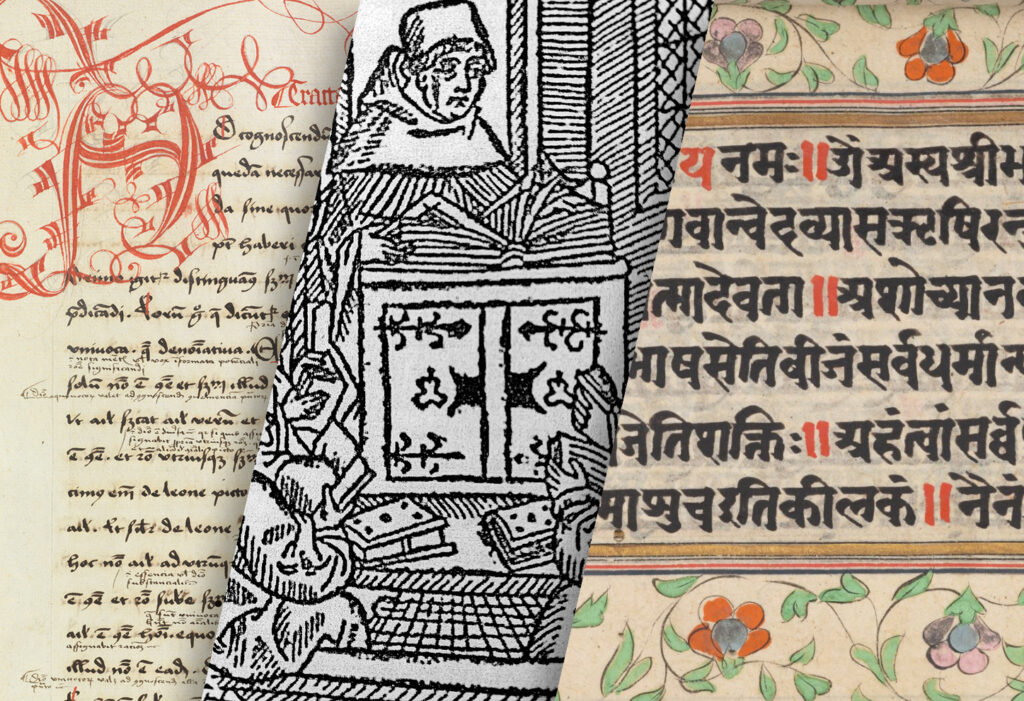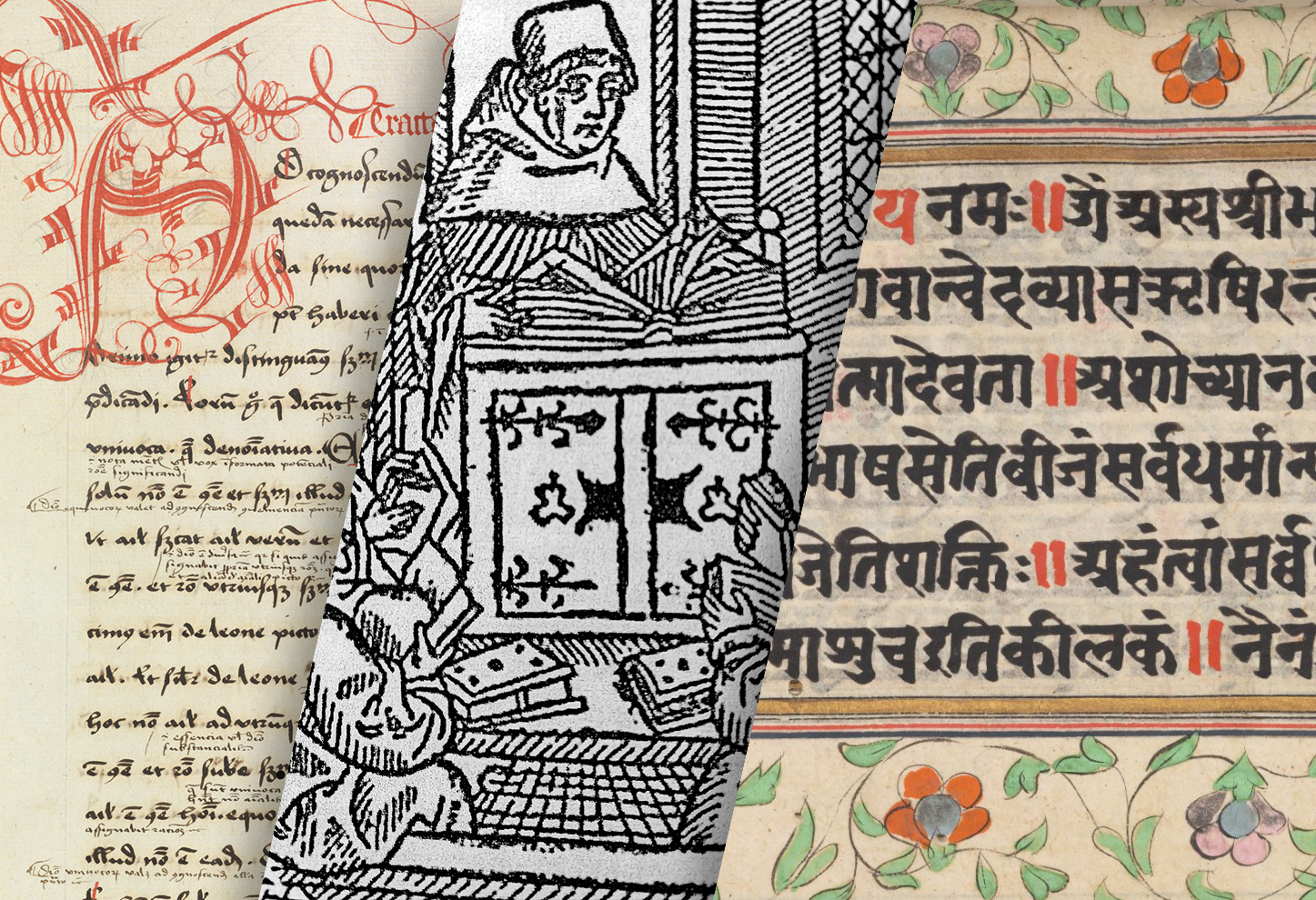
Link
https://dch.phil-fak.uni-koeln.de/forschung/lazarus
Runtime
12/2013–01/2015
project participants
DCH, CCeH. Project lead: Prof. Dr. Patrick Sahle. Development, Technical Systems: Dr. Gioele Barabucci. Data modeling, development: Martina Gödel. Cooperation partners: Prof. Dr. Dr. h.c. Andreas Speer (Thomas Institute, University of Cologne), Dr. Thomas Malten (Institute for South Asian and Southeast Asian Studies (SASOA), University of Cologne), Prof. Dr. Georg Vogeler (now Centre for Information Modeling, Karl-Franzens-University Graz), Prof. Dr. Peter Orth (now Institute for Classical Studies, Department of Medieval Latin, University of Cologne).
Funding
Funded by the Ministry of Innovation, Science and Research of the State of North Rhine-Westphalia in the funding program Infrastructural Funding for the Humanities in North Rhine-Westphalia.
Description
The LAZARUS project (Long-term processing, accessibility and archiving of university collections) focused on the exemplary processing, sustainable preservation and permanent provision of digital research. The term “collections” not only included exclusively material-based collections, but also digital collections and resources such as those created in teaching and research projects.
Three exemplary university collections were selected for the project. These were (1) the Meister Eckhart Archive, (2) the Cologne Digital Sanskrit Lexicon (CDSL) and (3) Paläographie-Online. What all three collections have in common is that the respective data was already available in different formats at the start of the project. While the Meister Eckhart Archive (1) is a physical archive for which only poorly structured textual descriptions are available, the Sanskrit Lexicon (2) already consists of digital full texts with an outdated user interface, and Paläographie-Online (3) consists of a collection of didactic materials, the usability of which also needs to be revised. In all three cases, the aim was to bring important research resources up to date in order to exploit their full potential.
The Data Center for the Humanities(DCH) was founded by the Faculty of Arts and Humanities to ensure the permanent presentation and archiving of digital research data. The aim was to develop generalizable and reusable methods and practices for the transfer of digital data stocks on the basis of an appropriate technical infrastructure. These were developed and tested on the LAZARUS collections by indexing and processing them.
Meister Eckhart Archive: https://thomasinstitut.uni-koeln.de/forschung/arbeitsstellen-und-langzeitprojekte/meister-eckhart-archiv
Project lead: Andreas Speer
Cataloguing and digitization: Maxime Mauriège
The Meister Eckhart Archive is essentially based on the estate of Prof. Dr. Joseph Koch (1885-1967), the director of the scholarly complete edition of the Latin works of the late medieval theologian and philosopher Meister Eckhart (1260-1328) and founder of the Thomas Institute at the University of Cologne. The archive contains files, testimonies and correspondence documenting the creation of Meister Eckhart’s Complete Edition from the 1930s to the present day. More than a thousand unpublished documents have already been digitized, cataloged and scientifically indexed. New document holdings, some from other archives, are currently being digitized and indexed.
As part of the funding in the LAZARUS project, the already compiled catalogs were transformed into a compatible format and imported with the help of the free archive software AtoM. A database and user interface based on this also forms the working environment for further indexing and the basis for an online presentation that optimizes the functionality of the archive and the visibility and usability of its materials.
The project is part of a program funded by the state of North Rhine-Westphalia in cooperation with the CCeH for the preparation, sustainable preservation and permanent provision of digital research. The launch of the website has been delayed for technical, operational and data protection reasons and is expected to take place in the course of 2021.
Cologne Digital Sanskrit Lexicon (CDSL): https://sanskrit-lexicon.uni-koeln.de/
The different lexicons were originally developed and implemented by: Dr. Thomas Malten (University of Cologne, e-mail: th.malten@uni-koeln.de), Peter Scharf (Brown University), Malcolm D. Hyman (Max Planck Institute for the History of Science, Berlin), Jim Funderburk
The Cologne Digital Sanskrit Lexicon (CDSL) is a lexical data collection of Sanskrit. It contains information from around 14 Sanskrit dictionaries and other lexical resources, some of which are very extensive, in digital form, making it the largest digital collection of its kind on Sanskrit. The CDSL is an essential basis for dealing with Sanskrit texts in research and teaching all over the world.
The foundations of the digital collection had already been laid in 1994, meaning that the older data was no longer available in up-to-date formats at the time of the project. The individual dictionaries are separate resources with project-specific markup formats, some of which are available via a web application. The form of provision reflects the heterogeneity of the material and the evolved structure of the collection.
The aim of preparing this lexical treasure was to standardize the markup of the various resources using the established standard of the Text Encoding Initiative (TEI). A cross-dictionary search was of central importance in order to tap the full potential of this unique database.
In addition to CDSL, see also the C-Salt platform, which has been in operation since 2017 and bundles the various activities of the CCeH, DCH and IfL in the field of South Asian language resources.
Paleography Online: http://www.palaeographie-online.de/
Published by:
Prof. Dr. Peter Orth
Prof. Dr. Georg Vogeler
Since 2005, Palaeography Online has been providing an auxiliary scientific e-learning offer for transcription, which is successfully used by various disciplines throughout the German-speaking world for university education (over 1000 registered users). It essentially comprises a chronologically and thematically organized series of exercises on the palaeography of Roman antiquity and the Western Middle Ages, supplemented by an illustrated glossary and an overview of sample alphabets and abbreviations.
The aim of the project was to improve the functionality and user interface of the program and to create the technical prerequisites for the further development of Paläographie Online from a sophisticated learning tool to a research-relevant manuscript research tool. At the time, the system was based on outdated PHP scripts and Javascript functions. This required comprehensive remodeling, transfer to a modern database system and embedding in a permanent server infrastructure.
Picture credits
(from left to right) Aarau, Aargau Cantonal Library, MsMurF 84, fol. 99r, Petrus Hispanus, Petrus Tartaretus, http://www.e-codices.ch/en/kba/MurF0084/99r; a woodcut of unknown origin, often associated with Meister Eckhart (s. e.g. https://www. heiligenlexikon.de/BiographienE/Meister_Eckhard_Eckart.htm); London, British Library, Or 8837, fol. 4r, Excerpt from the Bhagavad Gita from the 18th century in Sanskrit, http://www.bl.uk/manuscripts/FullDisplay.aspx?ref=Or_8837.
